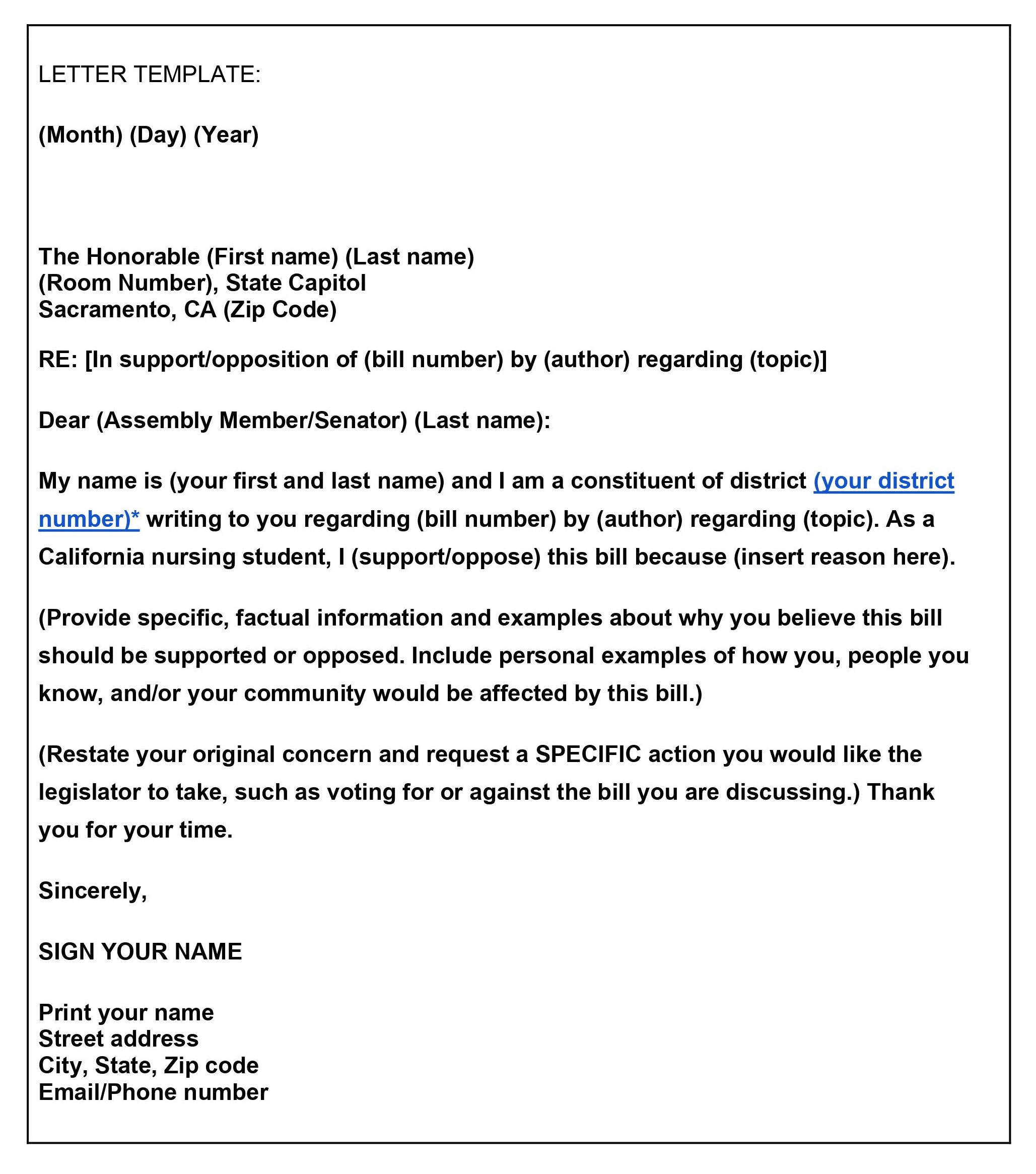Letter Writing
WHY SHOULD I WRITE A LETTER?
- The purpose of writing a letter to a legislator is to bring to their attention your stance on a particular political issue. This can be related to a bill undergoing the legislative process, or other concerns that you have that you feel need to be addressed as a California nursing student and future nurse.
- Your voice is important! Legislators need our input and feedback to understand what is important to us as nursing professionals.
- Legislators want your vote. Assisting nurses is very important to legislators. Nurses are the largest healthcare employee group in the US, with half a million nurses in California alone! As such a large component of the labor force, we hold a lot of power in the choices that legislators make...when we band our voices together!
- This page will go over the process of writing letters regarding bills undergoing the legislative process.
TRACKING CURRENT BILLS
OPTION 1 - To Look Up Specific Bills
*Remember to plan to submit your letter at least one week before this date.
OPTION 2 - To Look Up All Active Bills
*Keep in mind that the most ideal time to send a letter is one week before a committee hearing thus searching for committee hearings at least one week in advance of the day you are searching is an ideal way to scan for potential bills you could write to legislators about.
HOW SHOULD I WRITE A LETTER?
-
Although there are many ways to write a letter, here is a basic format that is short, efficient, and effective at getting your point across to legislators.
-
Paragraph 1: State who you are, why you are writing the letter, your credentials (nursing student), and that you are a constituent (a constituent is a person whom the voted official was voted on to represent). In addition, you will want to write the bill number you are discussing, as well as the author and topic the bill is covering.
-
Paragraph 2: Provide specific, factual information and examples about how you and others are affected by the topic you are addressing. You can also provide personal examples of how this bill may have affected you or people you know.
-
Paragraph 3: Restate your original concern and request a SPECIFIC action that you would like to be taken. An example of this may be to vote for or against a bill.
*How to find your district number:

DO’S AND DONT’S OF WRITING YOUR LETTER
-
DO’s
-
Keep your letter short and concise. Your letter should not be more than 2 pages long.
-
Add your personal signature at the bottom of the letter.
-
Your perspective as a nursing student is very valuable to legislators. State your unique position as a nursing student and discuss your knowledge and experience that is applicable to your letter’s overall purpose.
-
Be as concise and factual as possible in your statements.
-
Always proofread your letter. This increases your impact to the legislator as a credible professional.
-
Always use the appropriate honorifics. For example: Senator (last name) or Representative (last name).
-
Be respectful and thank the legislator for their time reading your letter.
-
You need to contain at minimum your home address. In addition, you can include your phone number and professional email address. It is very important to include your contact information so that the legislator can contact you if needed.
-
DONT’S
-
Send your letter to representatives that are not in your district and not connected to the bill you are discussing.
-
Fail to give adequate information and reasoning behind your written stance.
-
Write too much. Quality over quantity is key.
WHEN TO SEND YOUR LETTER:
-
You will want to send your letter at minimum one week before the committee hearing that will be discussing the bill.
-
You can determine what time you must send your letter by following the following steps:
-
1) If you do not have a specific bill in mind, but are looking for active bills to find one you would like to write about:
-
Look up the following instructions to find committee hearings for upcoming bills. Plan to send your letter at least one week before the date of the committee hearing for the bill you would like to write about. In particular, looking up bills by committee will be helpful in searching for bills related to nursing and health policy.
-
2) If you know your specific bill:
HOW TO SEND YOUR LETTER:
OPTION 1 - Position Letter Portal
OPTION 2 - Email
QUESTIONS?
Have questions? Need advice on your letter or help with editing? Please don’t hesitate to reach out to our Legislative Directors, Patrick Clavillas and Kaitlin Yang! patrick@cnsa.org and [email protected].
|

